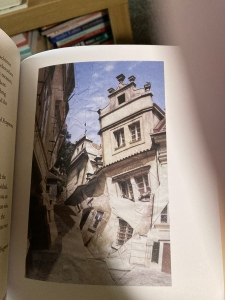The Questionnaire by Jirí Gruša
Czech fiction
Original title – Dotazník
Translator – Peter Kussi
Source – Personal copy
I draw this first Czech lit month to an end with a classic one of the writers that stayed in Czechoslovakia and he had been working in the philosophy department in Prague and writing for a number of periodicals in Czech. But his writing came to the attention of the authorities. He wrote this book in 1974 and it was one of those book =s that in the day was handtyped and passed around an underground book there was 19 copies circulated. He was arrested and sent to jail for two months after worldwide protests at his arrest he then lived in Germany. After the fall of communism he worked for the government in foreign affairs as the ambassador to Germany for Havel’s government when died Havel called him one of the few be close to I’m he deeply respected him. This is his best-known book as one man fills in an employee questionnaire and has the words on the top of the form DO NOT CROSS OUT.
1. GRANIT 01
On September 19, 197—, in the city of Prague (i.e., right here, not in the town of Chlumec), I visited the enterprise GRANIT, the sixteenth organization I had contacted over the past two years, and I received my sixteenth Questionnaire (in room 102, second floor), from
the hand of Comr. Pavlenda (Comr. = Comrade; i.e.,
friend, mate, companion, fellow member of a Communist society ).
In contrast to those previous questionnaires, this one was marked in the upper-right-hand corner, in blue pencil, most probably by Comr. Pavlenda himself: DO NOT CROSS OUT!—an exhortationThe opening and that command not to cross out thee questionnaire.
Jan Kepka is the man filling in the questionnaire. What follows is one of the most surreal works Kepka talks about around his family history is mother events during the war when a former Raf pilot during the war is a prisoner in the fifties. we see his family in the Czech countryside as he uses nature at times to explain the world around him. Our narrator Jan he is a garden designer and is applying for this job at Grant a low-level job as an Ensign this form he is given by the official Pavlenda. but the form is a stream-of-consciousness piece that drifts around events that happened like the 1968 uprising he uses his family history and past events to point out what is happening now from Nazis to communists it is kicking off regimes of how people are dehumanised. Jan tries to point out the pointlessness of the world. Surreal Twisting is a book that maybe needs a closer reading than I am as a reader. There are a lot of things like animals and insects recurring motifs that have a deeper meaning and maybe more of a meaning if you were sat in the dark in Prague reading the samizdat type copy of this book means more then. As we enter a series of questions answers twist and turn as our narrator digressions on the answers.
But the simple act of sliding the shoe-polish box to the window provided a definite basis for calculating the degree of Aryanism, according to Section A, para. 1, of government directive 156/40 (Regierungsverordnung).
The situation at the time was thus as follows:
a) Pater Stach was changing his cassock.
b) Jan Baptist Vachal, lodged in a small room in the chancery, was feeling much better in spite of having been told that he had lost a great deal of blood.
c) Prince Friedrich had passed the Anchor Inn on Jost Square, and was approaching St. Mary’s statue.
d) Kaspar Trubac was standing in front of his boarded-up store, trying to look as if the store was someone else’s property.
e) Alzbeta was peering through many human, and soon also equine, legs.One of the many list and here in the war years
This is a clever book that points out the faults in the regime he was living under at the time but in that clever way that it isn’t direct but twisted and turns around to the point it is a surreal work and mixes history and the present the complex history of the Czech Republic during and after the war. This like the earlier book Golden Age I reviewed showcases the surreal nature of Czech writing during the 20th century. Thus this book has little plot and is sometimes more like a straight family history but is it. As I said it is maybe a book that needs a real close reading to dig deeper into it in fact it would have made a great group read for this month as it is a complex book about family, loss, Czech life and well not crossing out on the form !!. Have you read this book?
Winston’s score – B I felt I maybe needed to read this a few times to fully get the book it has so many twists and turns in it rich wordplay.












